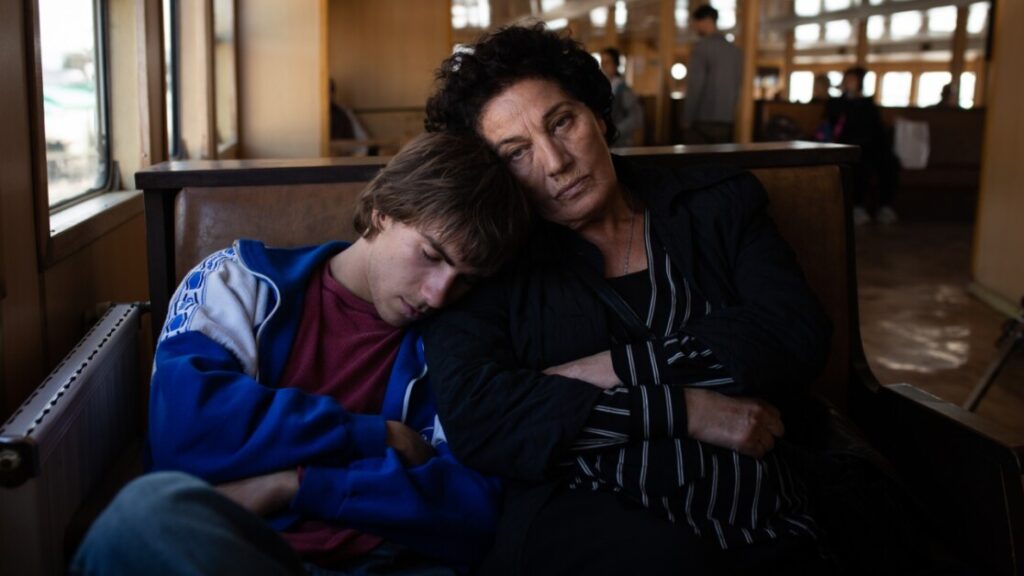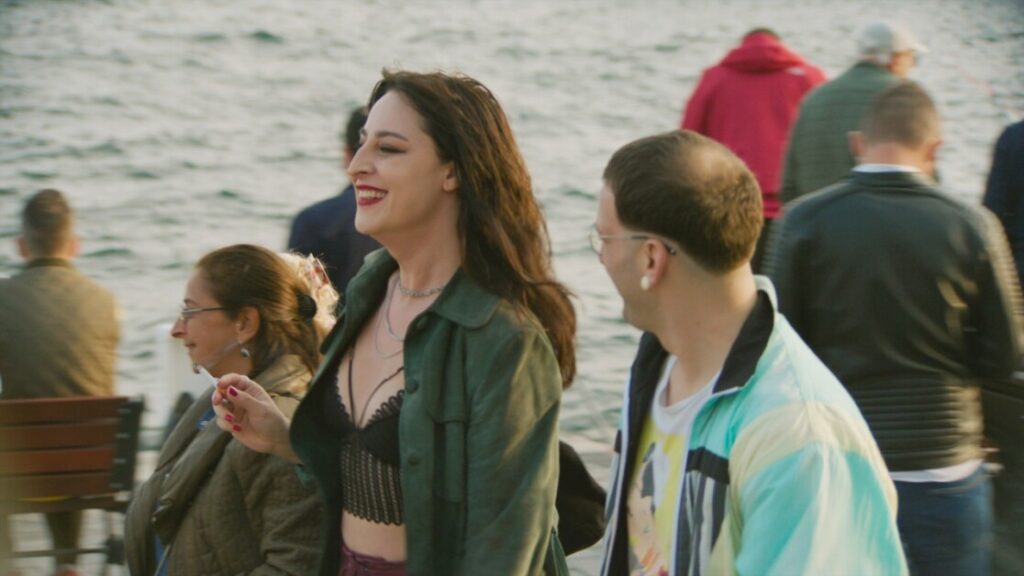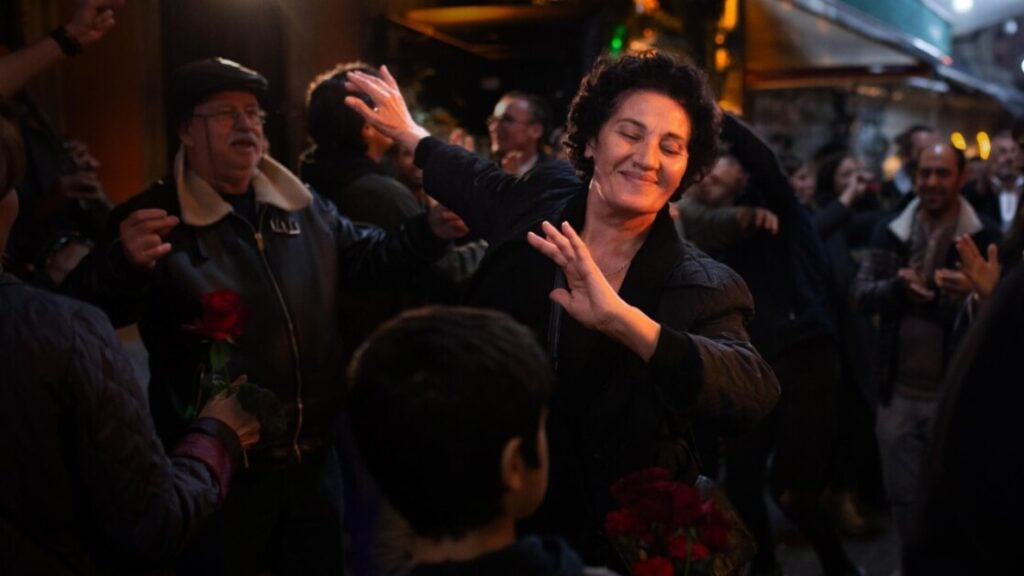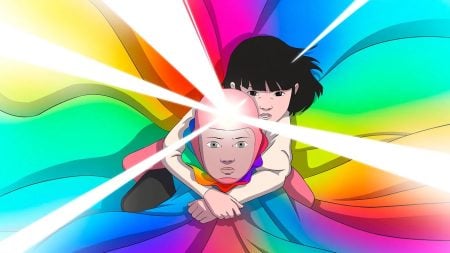Despite gaining worldwide fame for And Then We Danced in 2019, writer/director Levan Akin also faced a lot of backlash that year for including ‘controversial’ topics such as gay love and LGBTQIA+ representation. He didn’t let the critics stop him from making his new movie as his latest feature, Crossing, is more of the same: An important, engaging, courageous work about self-fulfillment, grief, and finding where you belong to that fights for equal rights.
Akin’s moving film opens with Achi (Lucas Kankava), who lives in the Georgian coastal town of Batumi, having a heated argument with his older brother and wife. Their chaotic life is brutally interrupted by the arrival of Achi’s sister Lia (Mzia Arabuli). When we meet Lia for the first time, she might not be the warmest and most open person you could wish for. The retired teacher seems stern, emotionless, and determined (bordering on being completely selfish), which might be the case because she’s from a generation in which women were taught to live emotionless by specific rules instead of following their hearts.
To ensure that you still want to go with her on her search for her transgender niece Tekla (Tako Kurdovanidze) – who was disowned by her transphobic parents – Arabuli (Tsinaparta Mitsa, Eskulapis Motsape) needs to give her character a lot of personality, empathy and even a softer side and she does that stunningly. She delivers a performance that’s nothing short of touching, spellbinding, and full of character.

Lia’s the beating heart of this multiple storylines movie as other of her family members are also going on tricky yet important searches of their own. The side journey you will follow the closest is Achi’s, as his storyline overlaps a lot with Lia’s. He supposedly has Tekla’s address in Istanbul and is willing to share it with Lia on the condition that she takes him with her. While Lia isn’t jumping for joy after accepting his proposal, it does give Kankava and Arabuli the chance to portray an unlikely but charming family relationship and partnership beautifully.
While Arabuli definitely takes the lead – both in the story and performance-wise – Kankava doesn’t lag behind. His performance derives from Achi’s self-journey, resulting in a touching and humorous portrayal that becomes much more mature the longer the story continues. While his acting is the opposite of Arabuli’s – mainly because their characters are entirely different – both performances complement each other beautifully. It’s great to see how two people who initially can’t stand each other grow emotionally closely to a point where there’s mutual trust and family love. As a writer, Akin knows how to create multilayered human beings, whose uniqueness increases even more because of the tremendous actors portraying them.
Speaking of tremendous performances, joining the duo is Evrim (Deniz Dumanli), the transgender lawyer, who is helping them find Tekla. While the first meeting between the three feels a bit forced – despite it being stunningly shot by And Then We Danced cinematographer Lisabi Fridell – Evrim’s story is a much-needed one as it’s definitely the driving force behind the second part of this feature. You learn more about the relationship between Evrim and Tekla and how much both people care for each other. Evrim’s love for Tekla is why Lia is much more open, kind and warm towards her, as they share an equal passion and concern for Tekla.

Evrim’s storyline isn’t only crucial for the movie itself but also for the (representation of the) LGBTQIA+ community. After seeing Emilia Pérez, in which a transgender woman starts an NGO charity to find missing people, Crossing re-enforces again that trans people can hold influential jobs like a lawyer while also being their true outgoing selves, despite the prejudices from society they face. Evrim is headstrong and determined during the day at work but also playful and flirty when she hits the dancefloor. Dumanli excels in portraying both sides equally well. Her performance is powerful, explosive, and full of fun, vibrancy and vitality.
The only downside to the LGBTQIA+ representation in this feature is that the central gaze is still the cis gaze, even when Evrim’s story takes over. Her essential presence and the oppression and discrimination LGBTQIA+ people face, especially in Turkey, would be highlighted even more if we see the story evolve through Evrim’s eyes as well. We would see more of how much harm and pain trans and LGBTQIA+ people feel every day and how important their community is to them.
While the last five minutes are unnecessary and too different from the rest of Crossing, Akin creates a portrayal that—despite being about loneliness, fulfillment, and strained family relationships—isn’t overdramatized and exaggerated. Instead, it’s a subtle, touching, and gentle work that powerfully stands up against the oppression of the transgender community.
Crossing is out in select cinemas now and will be available on MUBI from the 30th of August courtesy of MUBI.

While Crossing by Levan Akin hits a false note at the end, it's a powerful, moving and not too dramatic fight for the transgender community.
-
GVN Rating 7.5
-
User Ratings (0 Votes)
0





![‘Jay Kelly’ Review – Noah Baumbach Makes A Case For The Magic Of Movie Stardom [NYFF 2025] ‘Jay Kelly’ Review – Noah Baumbach Makes A Case For The Magic Of Movie Stardom [NYFF 2025]](https://cdn.geekvibesnation.com/wp-media-folder-geek-vibes-nation/wp-content/uploads/2025/11/Jay-Kelly-JKELLY_20240523_15320_C2_R-300x180.jpg)

